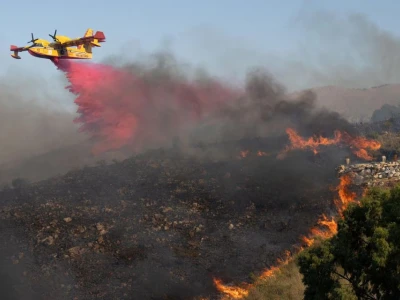
Island nations blame rich countries for climate inaction at UN assembly
To meet that goal, scientists say the world needs to cut global emissions in half by 2030, and to net-zero by 2050.
UNITED NATIONS, Sept 22 (Reuters) - Island nations bearing the brunt of climate change this week confronted rich countries at the United Nations General Assembly, saying the failure by developed countries to act with urgency had put the islands' survival at risk.
"There are many amongst us, the small and marginalized islands of our globe, surrounded by rising seas and scorched by rising temperatures, who are beginning to question this annual parade of flowery speeches and public pretense of brotherhood, otherwise known as the U.N. annual General Assembly," Saint Lucia Prime Minister Philip Pierre told the gathering on Friday.
Several speakers at the week-long event quoted U.N. Secretary-General Antonio Guterres, who in July cautioned that the era of global warming had ended and “the era of global boiling has arrived.”
A perceived lack of urgency by developed nations was a recurring theme. Speakers emphasized that a failure to sufficiently curb greenhouse gas emissions had contributed to rising sea levels, threatening island and low-lying nations.
"The problem is that those whose actions we most need may be so confident in their survival that they do not act early enough for us," Barbados Prime Minister Mia Mottley said on Friday.
Under the 2015 Paris Agreement on climate change mitigation, countries aimed to limit the rise in global temperatures to 1.5 degrees Celsius (2.7 degrees Fahrenheit), the threshold scientists say would head off the worst impacts of warming.
To meet that goal, scientists say the world needs to cut global emissions in half by 2030, and to net-zero by 2050.
"Unfortunately, the international community has not done nearly enough to get us on track to limiting the global average temperature increase to 1.5 degrees Celsius," Wesley Simina, president of Micronesia, said in a speech on Thursday.
"One need only scan the news on any random day to see the evidence of the climate crisis in devastating effects around the world today," he said.
Marshall Islands President David Kabua called for the establishment of an international financing facility to assist small island and low-lying atoll nations facing natural disasters.
Kabua said countries attending the U.N. COP28 climate summit beginning in November must recognize that the world is failing to deliver on the Paris Agreement and agree on a roadmap to correct course, including the phase-out of fossil fuels.
"These challenges might be inconvenient for large economies - but I can assure the climate impact's already at our door," he told the General Assembly.
U.S. President Joe Biden will host a second summit with leaders of the Pacific Islands Forum at the White House on Monday, where climate will be on the agenda. The gathering is part of Washington's efforts to step up engagement with a region where the U.S. is in a battle for influence with China.




